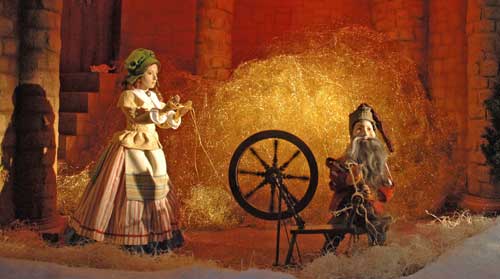Listen to this Dvorak symphonic poem, "The Golden Spinning Wheel".



Images of Rumplestiltskin from here and by Walter Crane; image of Sleeping Beauty by Ruth Sanderson
Now, the Dvorak piece you hopefully listened to is based off of a less well-known story. The reviewer on this site thinks the story sub par, but it sounds like a typical fairy tale, and I'm intrigued by the fact that the magical spinning wheel "spins out the awful truth" at the end. The summary from the site:
"Erben's Zlatý kolovrat tells the tale of a king who falls in love with a simple peasant girl. After he has invited her to his castle, her evil stepmother kills her, cuts off her feet and hands and removes her eyes, and substitutes her own daughter -- who is apparently the stepdaughter's spitting image -- in her place. Unwittingly, the king weds the evil daughter, but, fortunately, an old man stumbles across the body of the king's beloved. He sends his young lad up to the castle three times -- to exchange three items, including a golden spinning wheel, for the hands, feet, and eyes of the dead daughter -- and then proceeds to resurrect the king's beloved. The golden spinning wheel turns out to be the stepmother's and daughter's undoing: when the king's new bride begins to spin, the magic spinning wheel spins out the awful truth. The king seeks out his true beloved in the forest and the two live happily ever after, while the evil stepmother and daughter are eaten by wolves."
Not only is the spinning wheel a common feature in fairy tales, but spinning is part of the history of tales themselves. At night, when the women were doing their mending and spinning and other household tasks, they would tell stories to pass the time.
And symbolically, telling stories is often referred to as "spinning" a tale. The classical fates used to spin peoples' destinies-the past was the spun material, the present was what the spinner was controlling with their fingers, and the future was the thread yet to come. This controlling of destiny was often taken over by fairies in later stories.

No comments:
Post a Comment